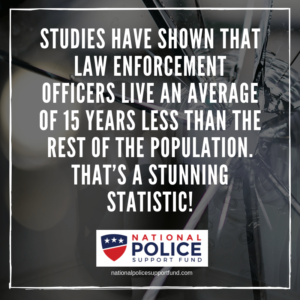Police officers face countless dangers on the job. From violent criminals to high speed chases, police officers face threats from all sides. However, there is a growing threat to America’s police officers that most of us are probably not aware of. Cardiovascular disease disproportionately affects the men and women of law enforcement when compared to the general population. So why is heart disease such a threat to police officers, and what can be done about it?
Heart Disease and Law Enforcement
Studies have shown that law enforcement officers live an average of 15 years less than the rest of the population. That’s a stunning statistic! One of the reasons for this discrepancy in life expectancy is the disproportionate risk of heart disease for law enforcement officials. According to the American Heart Association, the average age of a police officer who suffers a heart attack is 49 years old, compared to 67 years old for the general public.

One explanation of the prevalence of heart disease in law enforcement could be stress. According to a study conducted by the Harvard School of Public Health and Cambridge Health Alliance, police officers face 30 to 70 times more risk of sudden cardiac death when they are involved in stressful situations such as altercations with suspects. Police officers face stress levels that few of us can relate to, which helps explain their disproportionate risk of sudden cardiac death.
Although stress is certainly a factor in explaining the prevalence of heart disease among police officers, heart disease is largely preventable by a good diet and regular exercise. That is why department wellness programs and heart screenings are some of the most important things that can be done to help mitigate the risk of heart disease in police officers. Unfortunately, not much can be done about the stress police officers face on the job, stress that can lead directly to sudden cardiac death. However, a healthy diet, regular exercise and heart screenings are all ways that police officers can help lower their own risk of heart disease.








